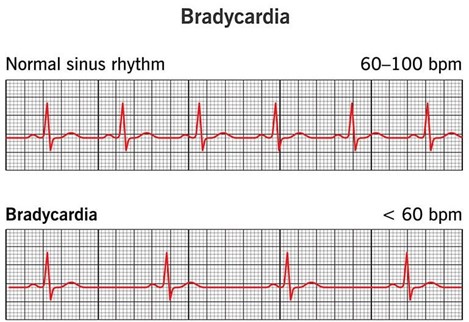A nurse in a provider’s office is collecting data from a client who has hypothyroidism. Which of the following findings should the nurse expect?
Blurred vision
Bradycardia
Insomnia
Moist skin
The Correct Answer is B
Choice A: Blurred vision is not a typical finding of hypothyroidism. It can be caused by other conditions, such as diabetes, glaucoma, or eye strain.
Choice B: Bradycardia is a slow heart rate, usually below 60 beats per minute. This is a common finding of hypothyroidism, as the thyroid hormone regulates the metabolic rate and affects the cardiovascular system. Low levels of thyroid hormone can cause the heart to beat slower and weaker.
Choice C: Insomnia is difficulty falling or staying asleep. This is not a common finding of hypothyroidism, as low thyroid hormone levels can cause fatigue, lethargy, and excessive sleepiness.
Choice D: Moist skin is not a common finding of hypothyroidism, as low thyroid hormone levels can cause dry skin, hair loss, and britle nails. Moist skin can be a sign of hyperthyroidism, which is the opposite condition of hypothyroidism.

Nursing Test Bank
Naxlex Comprehensive Predictor Exams
Related Questions
Correct Answer is B
Explanation
Choice A: “I put lotion between my toes.” This is incorrect because putting lotion between the toes can create a moist environment that promotes fungal growth and infection. The client should apply lotion to the tops and botoms of the feet, but avoid the areas between the toes.
Choice B: “I check my feet every day for sores and bruises.” This is correct because checking the feet every day for any signs of injury, infection, or ulceration is an important part of foot care for a client who has diabetes mellitus. The client should also report any problems to the provider and seek prompt treatment.
Choice C: “I wear sandals in warm weather.” This is incorrect because wearing sandals can expose the feet to injury, sunburn, or insect bites. The client should wear closed-toe shoes that fit well and protect the feet from trauma and environmental hazards.
Choice D: “I soak my feet in warm, soapy water every night before I go to bed.” This is incorrect because soaking the feet can cause maceration of the skin and increase the risk of infection. The client should wash the feet with mild soap and warm water, but not soak them. The client should also dry the feet thoroughly, especially between the toes.
Correct Answer is A
Explanation
Choice A: “I will feel shaky.” This is a correct statement, as shakiness is a common manifestation of hypoglycemia, which is a low blood glucose level. Hypoglycemia can cause the sympathetic nervous system to release adrenaline, which can cause tremors, nervousness, and anxiety.
Choice B: “My skin will be warm and moist.” This is an incorrect statement, as warm and moist skin is not a typical manifestation of hypoglycemia. Warm and moist skin can be a sign of hyperglycemia, which is a high blood glucose level. Hyperglycemia can cause dehydration, which can lead to sweating and flushing.
Choice C: “I will be more thirsty than usual.” This is an incorrect statement, as thirst is not a typical manifestation of hypoglycemia. Thirst can be a sign of hyperglycemia, which can cause dehydration, as the body tries to flush out excess glucose through urine.
Choice D: “My appetite will be decreased.” This is an incorrect statement, as decreased appetite is not a typical manifestation of hypoglycemia. Decreased appetite can be a sign of other conditions, such as nausea, infection, or depression. Hypoglycemia can cause increased hunger, as the body needs more glucose to function properly.

Whether you are a student looking to ace your exams or a practicing nurse seeking to enhance your expertise , our nursing education contents will empower you with the confidence and competence to make a difference in the lives of patients and become a respected leader in the healthcare field.
Visit Naxlex, invest in your future and unlock endless possibilities with our unparalleled nursing education contents today
Report Wrong Answer on the Current Question
Do you disagree with the answer? If yes, what is your expected answer? Explain.
Kindly be descriptive with the issue you are facing.
